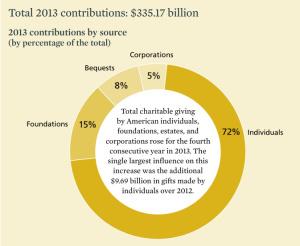 Just about every organization we work with of late has been seeking answers to a seemingly universal question in the non-profit community: “How do we attract more corporate support?”
Just about every organization we work with of late has been seeking answers to a seemingly universal question in the non-profit community: “How do we attract more corporate support?”
A fair question, but not when it comes at the exclusion of others, such as, “How do we increase annual giving from individuals?”
Or, “How do we build a pipeline of major gifts prospects from our constituent base?”
Time and time again, surveys of giving in the United States point to the importance of growing giving from individuals and not expecting corporations to become the lifeblood of non-profit organizations. In fact, in 2013 corporate philanthropy accounted for just five percent of all giving (as opposed to 80% that comes from individual gifts and bequests), according to figures released by Giving USA in its annual report. This figure is in keeping with findings in prior years.

Source: Giving USA
This points to the critical importance of non-profit boards and staff alike allocating time and efforts toward relationship-building. Companies – and foundations as well – generally have very clear agendas for their giving programs. It is simply not logical to think that companies should support a non-profit merely because that organization is in a particular community, does good things, and needs more money. A development plan that prioritizes corporate and foundation support over individual giving is leaving as much as 80% of its potential untapped, even if it is successful in increasing institutional support.
In addition, many companies – and an ever-growing number of foundations – look to giving rates among board, staff and constituent base as they consider whether to invest in a non-profit…pointing to the fact that a strong annual giving program is the bedrock of any successful development program.
Corporate philanthropy is an oxymoron
And make no mistake, these are business investment decisions. For a corporation, any spending decision – including gifts to and sponsorships of non-profit causes – is a business decision, not simply a philanthropic one. Such decisions must have clearly articulated returns on investment (ROI). Exposure, brand-building, new business opportunities, increased sales, low-cost access to and training of future employees…these are all potential returns that companies may look for, among others. Those non-profits that can effectively present meaningful engagement opportunities for companies stand the best chance of securing their philanthropic investments.
People give to people
Ultimately, though, as is often said in fundraising, “people give to people.” Whether an organization is hoping to attract corporate support, foundation grants, or individual gifts, attention must always be paid to the notion that relationships matter. Corporations do make spending decisions, people within them do. Those non-profits that build relationships with people in positions of influence within prospect corporations – and clearly lay out the business proposition of how an investment in the non-profit can advance the company’s goals – stand the best chance of building successful corporate giving programs.
A healthy development program – like any other business plan – should rely upon multiple sources of revenue. Corporate support is but one of these. Annual giving, major gifts, planned giving, grants, special events, earned income opportunities…these are all also pieces of a sustainable program.
Those non-profit boards and staff that feel they should focus on corporate support rather than building pipelines of individual donors are far less likely, then, to realize their potential for attracting philanthropic support either from the corporate sector or from individuals. Those organizations, on the other hand, that invest their time and energy in building meaningful relationships with people – individual donors, corporate representatives, foundation program officers – and tell compelling stories backed by quantifiable data and ROI are the ones that will succeed in the long run.
This post originally appeared on RPR Fundraising‘s blog.

